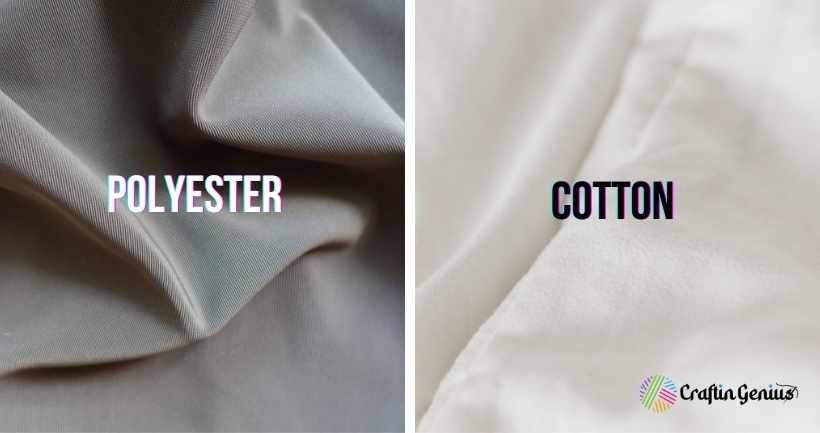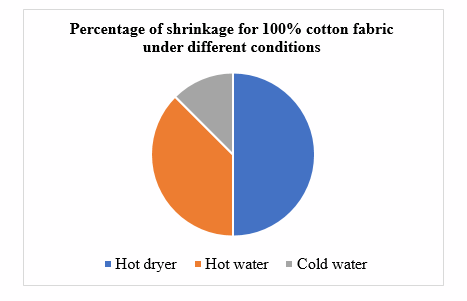A plant-based natural fabric like cotton reigned the world for centuries in terms of the best fitted and comfortable materials.
But, this cotton also follows Newton’s third law, which is the reaction for every action. That brings many of the cons for cotton-like wrinkling, shrinking, etc.
To only attain the pros from cotton and omit the down-parts, various blends of cotton such as 60 cotton 40 polyesters have emerged.
Now, you may wonder, will 60 cotton 40 polyester shrink, or to which extent it might shrink?
The blend of 60 cotton and 40 polyesters will shrink, but the shrinking level wouldn’t be the same as pure cotton fabrics. Cotton is a natural plant-based fabric whose higher concentration makes the whole blend favorable to shrinkage.
Let us consider the following article as a whole.
We’ll discuss the following:
- How much will a cotton-polyester blend shrink?
- Do 60 cotton and 40 modal shrink?
- How much does 60 cotton 40 polyester shrink?
- How do you shrink 60 cotton 40 polyester sweatpants?
- Does cotton and polyester shrink in the dryer?
- Will 60 cotton 40 polyester bleach?
- Does 50 percent cotton 50 percent polyester shrink?
- How do you wash a cotton shirt so it won’t shrink?
- How much does a 100% cotton shirt shrink in the dryer?
- FAQs

How much will a cotton-polyester blend shrink?
Before knowing about the shrinkage of a cotton-polyester blend, we first should interpret where the shrinking of clothing comes from!
And, to cotton, we should get into the facts of chemistry because a single leaf cannot fall without the blessing of chemistry. With that being said, no matter it is a natural or synthetics fabric, all fabrics are made from the same source known as polymers.
Polymers are chained-like substances that can be long and short, depending on the type of fabric. The chains within the polymer tend to tie in with one another through internal bonding. Such sort of bonds are pretty strong and remain tightly in both natural and synthetic fabrics.
Coming towards the two types of fabrics, natural fabrics are directly obtained from plant or animal sources. At the same time, synthetic materials are more on the side of artificial fibers.
In the language of chemistry, the main difference between the two types of these fabrics is that natural fabrics contain short-chained polymers. On the other hand, synthetic fabrics are long-chained polymers from artificial sources
We also know fabrics like cotton, silk, wool, muslin, etc., fall under the list of natural materials. And, clothes made out of these natural fibers are the prime reason which yields shrinkage of clothes after a wash. The reason behind this shrinkage is again related to their short-chained polymers.
When such natural fabrics are taken for preparing garments in the industry, they go through weaving and different sorts of chemical processing. Under such circumstances, the short-chained polymers are pulled long to yield garments.
Due to such artificial lengthening, when heat is applied later, the fiber chains inside the natural fabrics again get back to their natural position. And therefore, the materials are known to get shrinked.
But, such things do not happen in the case of synthetic fabrics like polyester, nylon, etc. Because they are made long from the very beginning to meet the demands of garments, they don’t have the risk or tendency to become shortened, contracted, or therefore shrink for the majority of cases.
As a result, a fabric made out of wholly cotton will only know to shrink, and materials containing pure polyester will not shrink at all or shrink very hardly.
Do 60 cotton and 40 modal shrink?
Yes, before describing anything else, we would directly like to interpret that 60 cotton and 40 modal blends tend to shrink.
Now coming towards how they do so, the fact of considerations are same as mentioned above. Here, in this blend of cotton and modal, we first need to identify the shrinkage level of both ingredients. Then we need to consider their concentration levels based on which the ultimate output can be derived.
With that said, cotton within the blend of cotton and modal is the inky ingredient being a natural fabric which leads to shrinkage. Whereas the modal is not know prominent for shrinking as it is not a natural fabric at the first place.
Modal are actually neither natural, nor they are completely synthetic. In fact, modals are semi-synthetic fabrics that are obtained from a kind of plant source and later modified so much artificially that they lose the tag of being natural.
As a result, due to their semi synthetic traces, the fabric also shows less-shrinking tendency compared to the cottons. Not actually less, in fact, modals can show anti-shrinking capabilities that can resist the shrinkage of cotton in the blend of cotton and modal.
Now coming towards the compounds’ concentration, the higher the natural fabrics, the more shrinkage is. The higher the synthetic fibers, the less is the shrinkage. This fundamental principle relates to the concentration of fabric blends applicable to the 60 kinds of cotton 40 modal.
As the amount of cotton is significantly more than the modal, 60 cotton 40 models will shrink after a session of dry wash.
How much does 60 cotton 40 polyester shrink?
Sixty cotton and 40 polyesters will shrink right according to their respective concentration levels within the blend.
Here, in the blend of 60 cotton 40 polyester fabric, cotton dominates by 20% more than polyester. Again, polyester is not any pure shrinkage resisting component that will withstand the shrinkage at any cost, which is to say that even 100% of polyester can shrink under intense heating sessions and adverse effects.
So, considering all the necessary facts, it is a must that 60 cotton 40 polyesters will shrink. But it won’t shrink it’s best that a fabric made out of 100% cotton can do.
As a result, 60 cotton 40 polyester blends will shrink up to 5% during the first time wash right after the purchase.
How do you shrink 60 cotton 40 polyester sweatpants?
You can shrink 60 cotton 40 polyester sweatpants like you would for any other 60 kinds of cotton 40 polyester blends.
For such sorts of fabrics, the shrinking capacity is slightly minimized but not stopped completely. In other words, it can be said that such kind of cotton polyester blend with 60-40 concentration levels is for balancing out the system. Feature and side effects of the available fabrics that pure cotton or polyester fabric provide are modified through such blends.
To shrink the blend, a regular session of dry washing is enough due to a higher cotton content. For better results, you can use a hot temperature during the washing session.
Does cotton and polyester shrink in the dryer?
Almost there remains not a single fabric that will escape from shrinking after coming out from a dryer. Being it is a synthetic fabric like polyester or natural cotton fabrics, the results are indisputable.
And, if the fabric is natural or blends natural and synthetic fibers, the rate of shrinkage increases even more by a dryer.
Cotton can shrink up to 20% during the first time contact with a dryer. At the same time, polyester can shrink from 2-3%.
Will 60 cotton 40 polyester bleach?
Again, the whole scenario hits back based on the concentration level of the blend. Natural fabrics are at a higher risk of getting bleached. Synthetic compounds are not prone to that much bleaching compared to natural fibers.
In the blend of cotton polyester with the concentration of 60% cotton, natural fabrics remain in dominance. As a result, the bleaching properties of the mix also increase with the increase in cotton contents.
Also read: Does Cotton Shrink Every Time You Wash It? Yes! Here’s Why
Does 50 percent cotton 50 percent polyester shrink?
Well, basically, as both natural and synthetic compounds are equal in concentration, neither shrinking nor elongation should occur.
But, technically, they will shrink anyway for several mild cases. First of all, the blend contains 50 percent cotton, which will want the fabric to shrink. But the other 50 percent of the concentration comes from polyester, which doesn’t shrink quickly but doesn’t oppose the shrink.
This is to say; polyester will also shrink at the intense hot drying session.
As a result, there is no reason that 50% cotton 50% polyester won’t shrink.
How do you wash a cotton shirt so it won’t shrink?
The same basic anti-shrinking procedure of washing cotton shirts or fabrics is to wash them in cold water.
Hot temperature Is the main reason behind shrinkage because it shortens the length of polymer chains in the cotton.
So, you can maximize the rate of shrinkage to many folds by executing cold wash and air drying.
How much does a 100% cotton shirt shrink in the dryer?
Any fabrics including 100% cotton shrink the most in a dryer compared to any other process.
Even hot water does not make that much shrinking that a dryer would cause. Got dryer implies direct heat on your fabric which is way harsher than hot water.
As a result, a shirt made of 100% cotton will shrink up to 20% in a dryer, and a pre-shrunk 100% cotton shirt will shrink 3%.
A report on the rate of shrinking for 100% cotton is as follows:

We can see that cotton shrinks the most under hot drying sessions, up to 20%. However, for hot water wash, 100% cotton shrinks near about 15%, and cold water makes the shrinking to only 5%.
FAQ about Will 60 Cotton 40 Polyester Shrink? how much they shrink
1. Does cotton shrink in hot water?
As cotton is a natural fabric made of short-chained polymers, their contact with any warm temperate source will make them. That also includes hot water, to be exact.
2. What is the best cotton polyester blend?
Although 100% cotton fabric is ever-demanding in the market, the superior alternative of 100% cotton is a 50 cotton 50 polyester blend. The blend offers similar features like 100% cotton and removes many of the contradicting parts that 100% cotton fabric provides.
Our verdict on Will 60 Cotton 40 Polyester Shrink? how much they shrink
So, to provide a perfect balance, blends of cotton and polyester are used in the manufacturing of fabrics. And, their respective shrinkage can be modified based on the concentration levels of cotton and polyester.

Emily’s passion for crafting knows no bounds. She has spent years perfecting her skills, from mastering intricate knitting patterns to sculpting beautiful ceramics and everything in between. Her artistic talents have made her a force to be reckoned with in the crafting community.
